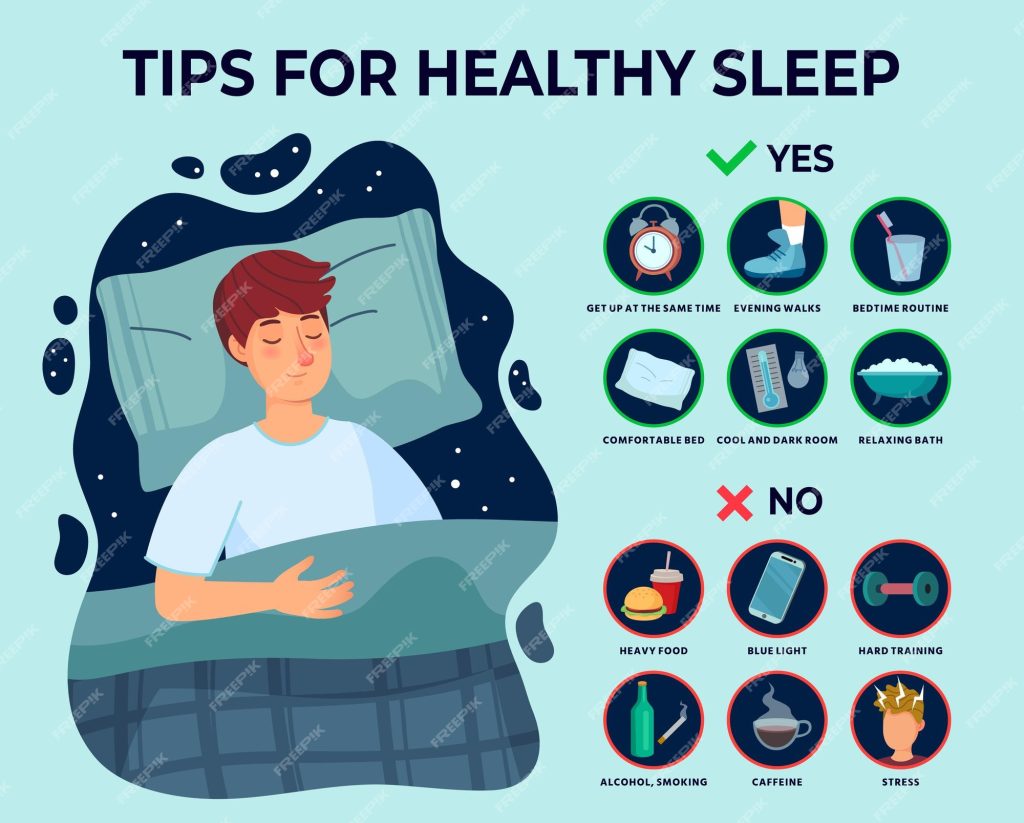Developing Healthy Sleep Habits for Better Well-being

Are you tired of feeling groggy and unrefreshed after a night’s sleep? Do you struggle to fall asleep or stay asleep due to stressful thoughts or a busy mind? Developing healthy sleep habits is essential for maintaining overall well-being, both physically and mentally. In this article, we’ll explore the importance of sleep, common sleep challenges, and practical tips to improve your sleep quality.
The Importance of Sleep for Healthy Well-being
Sleep plays a vital role in our daily lives, affecting our physical and mental health. During sleep, our bodies repair and regenerate damaged cells, build bone and muscle, and strengthen our immune systems. Sleep also helps to:
- Regulate emotions and reduce stress
- Improve cognitive function and memory
- Support weight management and metabolism
- Enhance athletic performance and endurance
- Increase lifespan and overall quality of life
Common Sleep Challenges
Many of us experience sleep challenges that can disrupt our ability to rest and recharge. Some common sleep challenges include:
- Insomnia: Difficulty falling asleep or staying asleep
- Sleep Apnea: Pauses in breathing during sleep, leading to frequent awakenings
- Narcolepsy: Excessive daytime sleepiness and uncontrollable sleep attacks
- Sleep Debt: Accumulating sleep deficits due to inadequate sleep or disrupted sleep patterns
- Circadian Rhythm Disorders: Difficulty adjusting to a regular sleep schedule due to varying work or social schedules
Creating a Sleep-Conducive Environment

Transforming your bedroom into a sleep haven can greatly improve your sleep quality. Consider the following tips:
- Darkness: Dim lights, blackout curtains, or shades create a sleep-friendly environment
- Quiet: Invest in a white noise machine or earplugs to block out external noise
- Cool: Maintain a comfortable temperature between 60°F and 67°F (15°C and 19°C)
- Comfort: Choose a supportive mattress and comfortable pillows
- Minimize Electronics: Avoid using electronic devices in the bedroom, or keep them out of sight
Establishing a Relaxing Bedtime Routine
Develop a calming pre-sleep routine to signal to your brain that it’s time to rest. Try:
- Reading: Reading a book or magazine before bed can be soothing and distracting from stress
- Meditation or Deep Breathing: Practice relaxation techniques to calm your mind and body
- Warm Bath or Shower: Relax your muscles and reduce stress with a warm bath or shower
- Listen to Music: Soothing music or nature sounds can create a peaceful atmosphere
- Avoid Screens: Tempting as it may be, avoid screens for at least an hour before bedtime
Establishing a Consistent Sleep Schedule
Develop a sleep schedule that works for you by incorporating the following tips:
- Set a Bedtime: Choose a consistent bedtime and wake-up time each day
- Stick to a Routine: Aim for 7-9 hours of sleep per night to help regulate your body’s natural rhythms
- Avoid Naps: Limit naps to 20-30 minutes and avoid them close to bedtime
- Gradually Adjust: If returning to a normal sleep schedule after vacation or an unusual sleep pattern, gradually adjust your sleep time to prevent sleep debt
Managing Sleep-Disrupting Habits
Identify and address habits that interfere with your sleep quality:
- Substance Use: Limit caffeine, nicotine, and other stimulants before bedtime
- Exercise: Avoid vigorous exercise within 3 hours of bedtime
- Eating Late: Avoid heavy meals or snacks within 2 hours of bedtime
- Sleep Disorders: Consult a healthcare professional if experiencing persistent sleep disruptions
Staying Consistent and Patient
Developing healthy sleep habits takes time and effort. Be patient and persistent, and remember:
- Small Changes Add Up: Start with small changes and build consistency over time
- Monitor Progress: Keep a sleep diary or use a sleep-tracking app to track your progress
- Seek Support: Share your goals with a friend or family member and ask for their support
Conclusion
Developing healthy sleep habits is a journey, not a destination. By creating a sleep-conducive environment, establishing a relaxing bedtime routine, and maintaining a consistent sleep schedule, you’ll be on your way to enjoying improved sleep quality and overall well-being. Share this article with a friend or family member who may be struggling with sleep challenges, and encourage them to start their journey towards better sleep today!
Share this article with someone who needs it.


